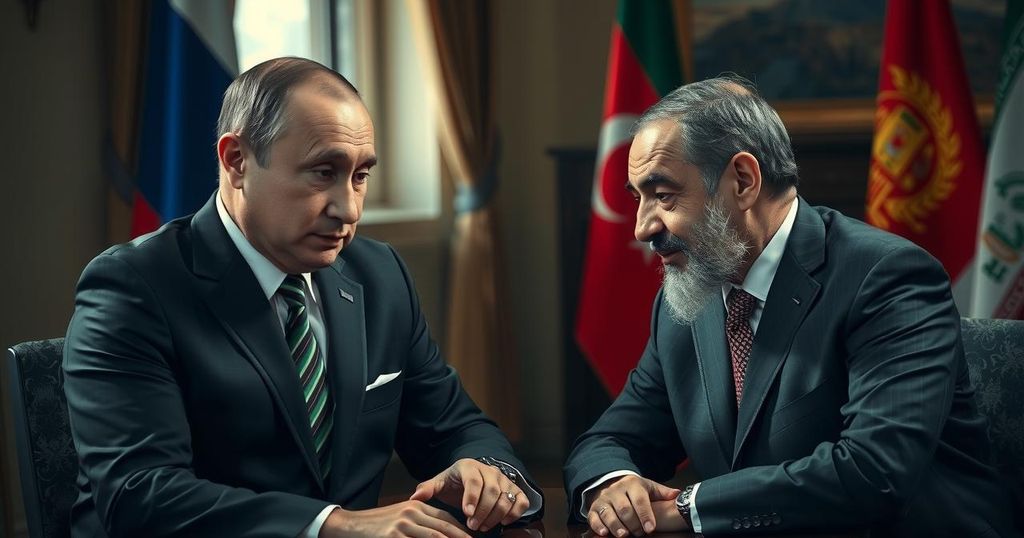Putin and Pezeshkian’s Meeting: An Alliance Amid Middle Eastern Turmoil

Russian President Vladimir Putin met Iranian President Masoud Pezeshkian in Turkmenistan to discuss increasing tensions in the Middle East, particularly between Israel and Iran. The meeting precedes a strategic partnership agreement expected to be signed at the upcoming BRICS summit. Both leaders expressed confidence in the growing relationship between their nations, while Pezeshkian condemned Israel’s military actions in Lebanon. The geopolitical implications of their discussions reflect a shift towards a more multipolar world as both countries seek to counter Western influence.
In a critical meeting held during a regional conference in Turkmenistan, Russian President Vladimir Putin engaged with Iran’s newly elected President Masoud Pezeshkian amid escalating tensions in the Middle East, particularly pronounced in the ongoing conflict involving Israel and Iran’s allied groups. The discussions, as reported by Russian state media, encompassed the precarious situation in the region prior to an expected strategic partnership agreement between the two nations. This agreement is anticipated to be finalized during the upcoming BRICS summit in Russia from October 22-24, which Putin has formally invited Pezeshkian to attend. President Putin emphasized the strong alignment in international affairs between Moscow and Tehran, stating, “Relations with Iran are a priority for us. They are developing very successfully.” Similarly, Pezeshkian noted the strengthening cultural and economic ties between the two countries, remarking that these communications are becoming “more robust” on a daily basis. During their discussion, Pezeshkian condemned what he termed Israel’s “savage attacks” in Lebanon, urging for an end to the violence against innocent civilians, and attributing complicity to the U.S. and Europe in these actions. The Israeli military has intensified its operations in southern Lebanon, actively engaged in combat against Hezbollah, the Lebanese group backed by Iran. It is pertinent to note that Russia has vocally criticized Israel’s military tactics in Lebanon and Gaza, especially concerning civilian casualties. Since the initiation of the Ukraine conflict in 2022, ties between Russia and Iran have notably strengthened. The United States has accused Iran of supplying Russia with military resources for use in its invasion of Ukraine, a claim that Tehran has consistently denied. Prior to the conference’s commencement, President Putin articulated a desire to shape a “new world order” among Moscow’s allies to challenge Western dominance, advocating for extensive discussions regarding a multipolar world in various international forums, including BRICS, the Shanghai Cooperation Organization, and others. Regional leaders, including Pakistan’s President Asif Ali Zardari and heads from Central Asian nations, were also present at the conference, highlighting the growing geopolitical dynamics in the region.
The Middle East has been characterized by complex geopolitical interactions, particularly between Iran and Israel. The meeting between the leaders of Russia and Iran occurs amidst heightened tensions, as Israel engages militarily against Hezbollah in Lebanon while also facing accusations of repressive actions towards Palestinians. Iran’s alignment with armed groups in the region and its support for Hezbollah complicate the conflict landscape. Russia, having criticized Israeli military operations, has increasingly fostered closer ties with Iran following its own international isolation due to the Ukraine war. This evolving partnership is marked by strategic discussions aimed at counterbalancing the influence of the West and the United States in Middle Eastern affairs, revealing a shift in regional and global power dynamics.
In conclusion, the meeting between Presidents Putin and Pezeshkian underscores the strengthening partnership between Russia and Iran amid escalating Middle Eastern conflict. With impending strategic agreements and a shared commitment to countering Western influence, both countries appear poised to foster closer ties economically and politically. As the situation in the region remains volatile, their collaboration will likely continue to shape future dynamics within the Middle East and beyond.
Original Source: www.aljazeera.com








